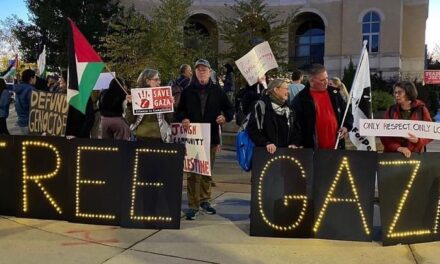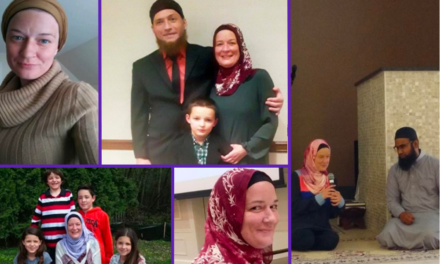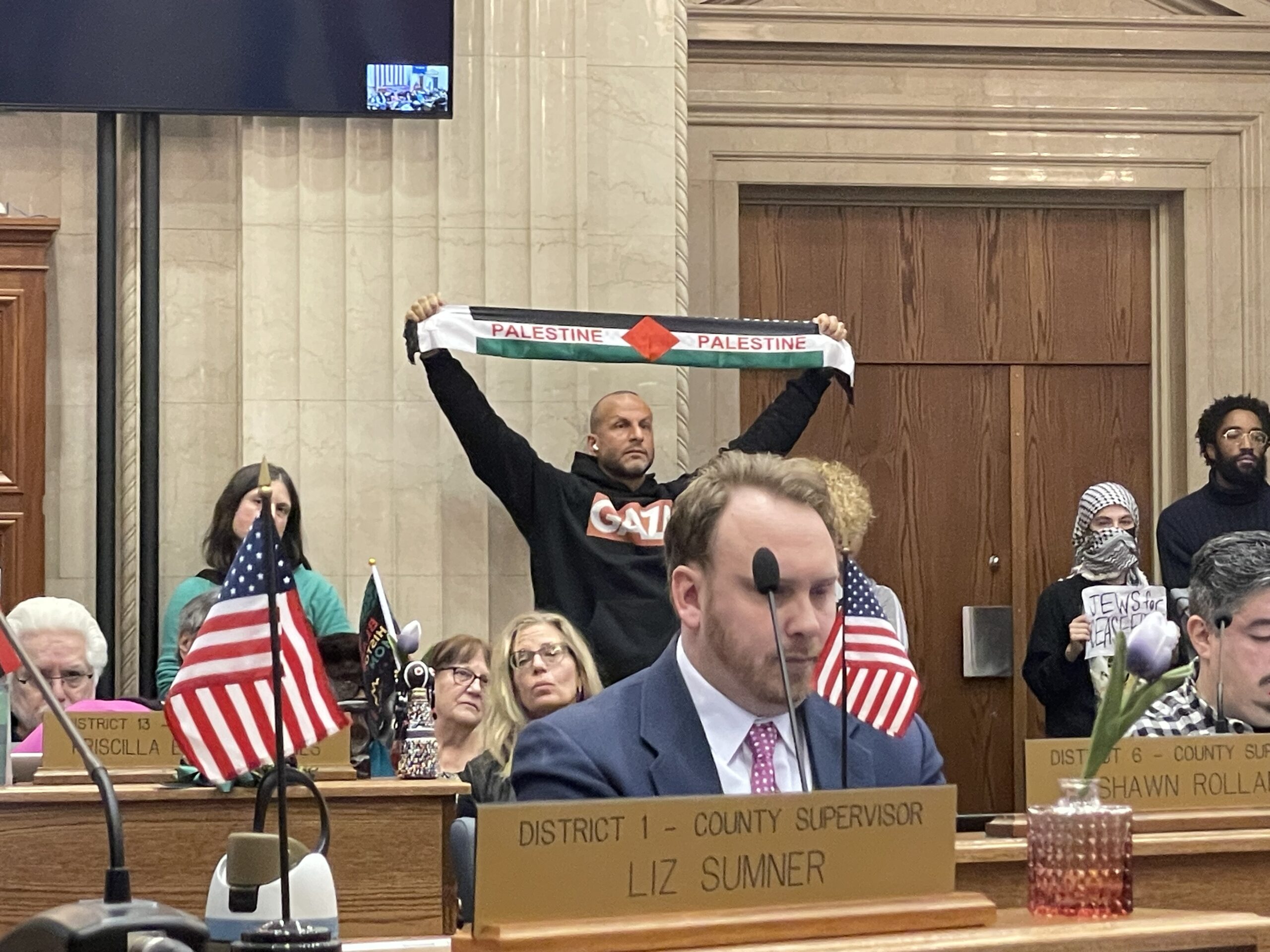
Supporters of a proposed resolution for a ceasefire in Gaza filled the Milwaukee County Board of Supervisors meeting Thursday, wearing keffiyehs and carrying signs.
This story is the first of two stories about efforts by Wisconsinites to stop the killing of civilians in Gaza. Watch for the second story in this series on Tuesday, April 2.
When the Madison Common Council unanimously approved a resolution Dec. 5 that called for an immediate ceasefire in Gaza, it was a voice crying in the wilderness. Only a smattering of cities nationwide had passed similar resolutions: Richmond, California, on Oct. 25; Atlanta on Nov. 20; and Detroit and Seattle on Nov. 21.
“I couldn’t stay silent,” Alderwoman Nasra Wehelie, who authored Madison’s resolution, said in an interview Sunday with Wisconsin Muslim Journal. “We can’t be complacent when seeing injustice anywhere. I received numerous emails and heard concerns from numerous constituents about what is happening in Gaza.” Her resolution passed unanimously.
With the Dane County Board passing its own ceasefire resolution in February, joined by the Waukesha County Democratic Party and the Milwaukee County Board of Supervisors last week, local ceasefire resolutions are gaining momentum here. In addition, a small group of Racine citizens secured sponsors over the weekend to bring a resolution before the Racine Common Council in a future meeting.
Frustrated by national leaders
As the death toll of Palestinians in Gaza rises daily (now at about 33,000 who have died directly by Israel’s military assault and additional starvation deaths of mainly the elderly and children), Americans increasingly call on their government representatives to take a stand. A January survey by the Arab American Institute found American voters are more likely to vote for candidates that support a ceasefire.
Yet, the ”Ceasefire Now” bill, sponsored by U.S. Rep. Cori Bush (D-MO), has languished in the House Committee on Foreign Affairs since it was introduced in October.
A United Nations ceasefire resolution passed yesterday when the United States abstained from voting, with 14 of the 15 members of the Security Council supporting it. The U.S. had previously used its veto to stop similar resolutions. The new resolution demands an immediate ceasefire in the month of Ramadan, which is now half over, the immediate and unconditional release of hostages and the expansion of aid into Gaza. (Israeli Foreign Minister Israel Katz said on X his country would not abide by the ceasefire resolution, CNN reported.)
The United Nations Security Council passed a resolution 14-0 Monday; the United States abstained. It demands an immediate ceasefire between Israel and Hamas in Gaza. (Click on the image to watch the video.)
Wisconsinites, like other U.S. citizens, frustrated by the inaction of their federal and state governments, now take their demands for ceasefire resolutions to local leaders. Proposed ceasefire resolutions are being heard in cities and counties, big and small, as well as political parties and organizations. Ceasefire proponents say this is an effective way to show state and federal representatives where their constituents stand on U.S. support of Israel as it bombards Gaza.
“We’ve been protesting on Saturdays, screaming at empty buildings and standing on street corners,” Mariah Casso of Racine, a co-founder of the Green Light Project, a local, grassroots initiative to raise awareness of social injustices, told WMJ Sunday. “We even drove all the way to Janesville to speak with U.S. Congressman Bryan Steil (R-Wis.) but we keep getting turned down.”
Advocates for Palestinian civilians focus on appealing to local officials appears to be working. Local ceasefire resolutions have been gaining momentum across the U.S., a January analysis by Reuters shows.
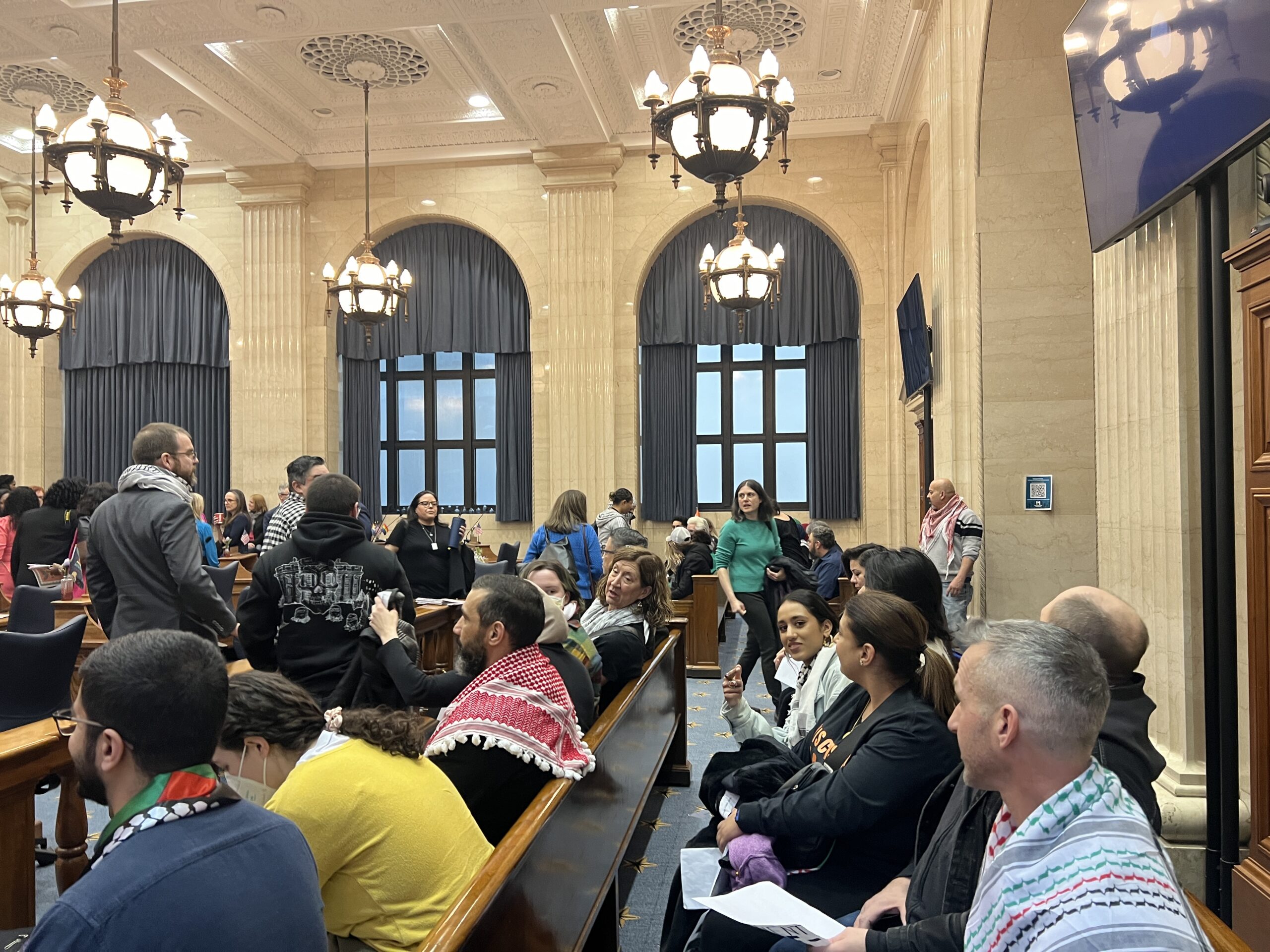
Photo by Samia Saeed
Milwaukee County Board of Supervisors passes ceasefire resolution
In a major victory for proponents of a ceasefire in Gaza, the Milwaukee County Board of Supervisors adopted a resolution Thursday “supporting and urging for a permanent ceasefire in Israel and in Gaza and in the West Bank.” The resolution was drafted by Supervisor Ryan Clancy and sponsored by Clancy with Supervisors Juan Miguel Martinez, Caroline Gómez-Tom and Steven Shea.
During the hours-long, emotional debate, several rooms in the Milwaukee County Courthouse were packed with supporters of the resolution, some wearing Palestinian keffiyehs and carrying signs or Palestinian flags. A substitute resolution evolved that dropped language from Clancy’s original resolution, including the word “genocide” and the number of Palestinians who have been killed.
The board voted 10-8 to adopt the compromise resolution, which it summarized in a statement that says:
“The substitute resolution acknowledges the longstanding conflict between Israel and Palestine, recognizing the devastating loss of lives it has caused. It urges all parties involved, including the people of Israel, Gaza and the West Bank, their supporters and world leaders to prioritize the immediate release of all Israeli hostages and the delivery of humanitarian aid to Palestinians who are suffering. Furthermore, the resolution calls for a path to permanent peace and prosperity in the region, emphasizing the importance of dialogue and diplomacy in resolving the conflict.
“The Milwaukee County Board of Supervisors has authorized the Office of Government Affairs staff to communicate the contents of this resolution with the Wisconsin Congressional delegation, highlighting the County’s stance on the issue.”
“Today we joined the many municipalities and counties who have called for an immediate, permanent ceasefire,” Clancy wrote on X (formerly Twitter) Thursday. “Although cowardice prevented us from accurately labeling this as genocide, this is a feat of organizing. Thank you to all who made this possible.”
Milwaukee County Supervisor Juan Miguel Martinez told WMJ, “I preferred the original language, but I think it is great we ended up passing a ceasefire resolution. Milwaukee does not want to be complicit.
“The original language was not meant to be antisemitic,” he explained. “My pro-Israeli constituents view the word ‘genocide’ as being used against them. But what is happening is a genocide. Genocide has not just happened to Jews. Native Americans, Rwandans and others have been victims of genocide.
“What is important is that we are speaking with our constituents. More and more people are coming together to say we don’t want this and stand with the Palestinian people. It is shameful how people are starved and children are being killed.”
After the vote, Clancy told WMJ, “I am beyond grateful to the many organizations and individuals who pushed for the original resolution, including the Wisconsin Coalition for Justice in Palestine.
“The turn-out at both the committee hearing and the full Board meeting, as well as the volume of emails and calls, surpassed every milestone for public engagement on any issue on record in the history of Milwaukee County. It is clear the opinion of the vast majority of the folks who reached out and showed up—and which reflects the opinion of county residents generally—is that what Israel is doing to the people of Palestine is genocide, that we have the responsibility and duty to stand up to it, and that grassroots pressure on American electeds might be the only way to stop it.
“I am both proud and grateful that we have now become one of the hundred counties and municipalities across the county that have called for a ceasefire,” Clancy said.
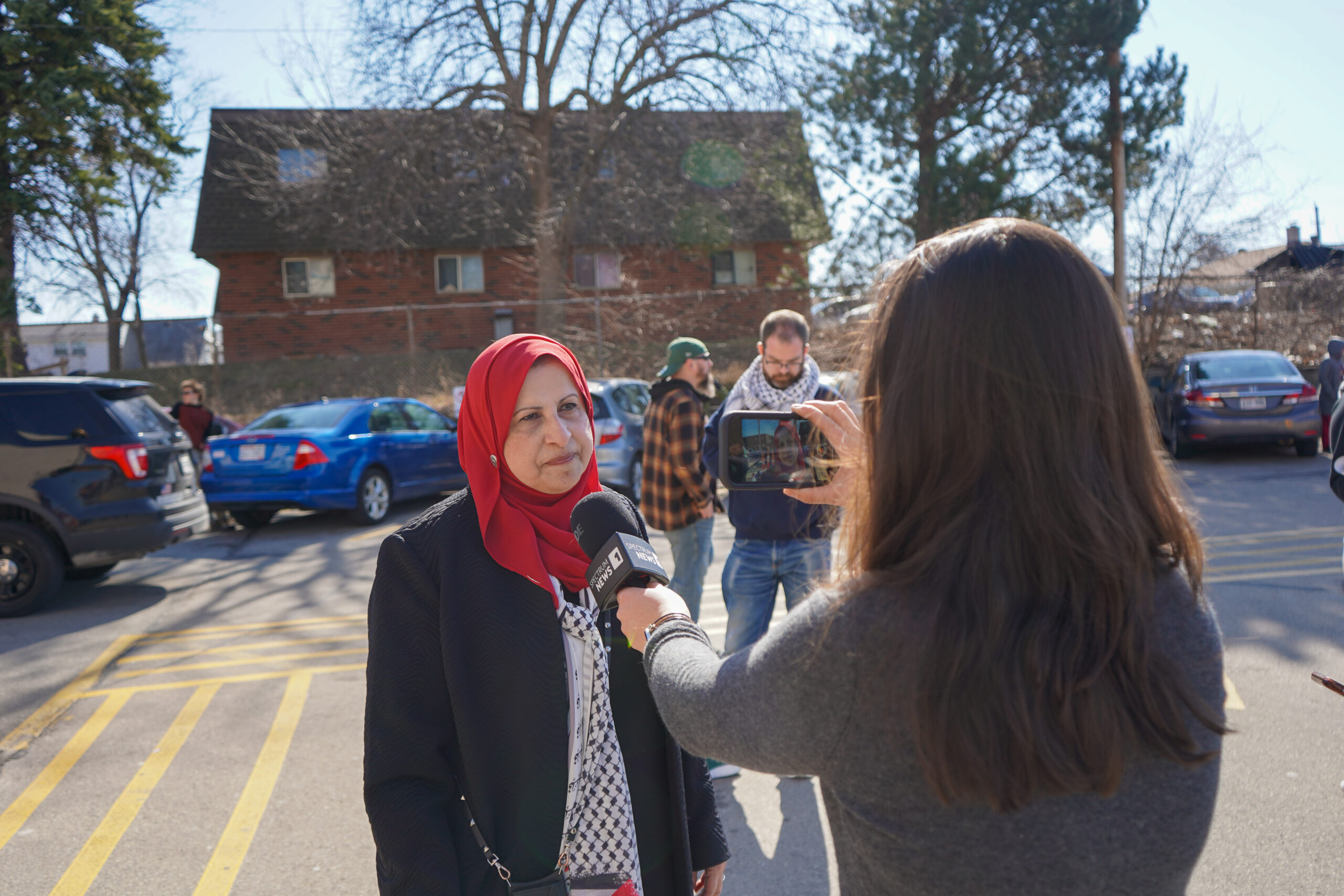

Photos by Kamal Moon
Janan Najeeb (left), founder of the Milwaukee Muslim Women’s Coalition and Rachel Ida Buff (right) , co-founder of Jewish Voice for Peace, have led the Wisconsin Coalition for Justice in Palestine, a coalition of 64 organizations, at numerous protests, calling campaigns and other initiatives since the coalition’s founding on Oct. 8.
Wisconsin Coalition for Justice in Palestine welcomes Milwaukee County resolution
“I consider it a victory,” Wisconsin Coalition for Justice in Palestine founder Janan Najeeb told WMJ in an interview Sunday. “We now join the more than 100 cities and municipalities that have passed resolutions calling for a permanent ceasefire.
“I’m disappointed they didn’t adopt Rep. Clancy’s original language because I consider it the most accurate,” she added. “They ignored the fact that there are far more Palestinian hostages being held by Israel in very miserable conditions.
“But there were a lot of incredibly positive things that happened,” she added. Among them, she listed the overwhelming attendance of diverse supporters of the resolution. “We had a very diverse and youthful presence, including many Jewish, LatinX, white and other people, in support of Rep. Clancy’s resolution. I found it interesting that in comparison, they had minimal representation on the other side.”
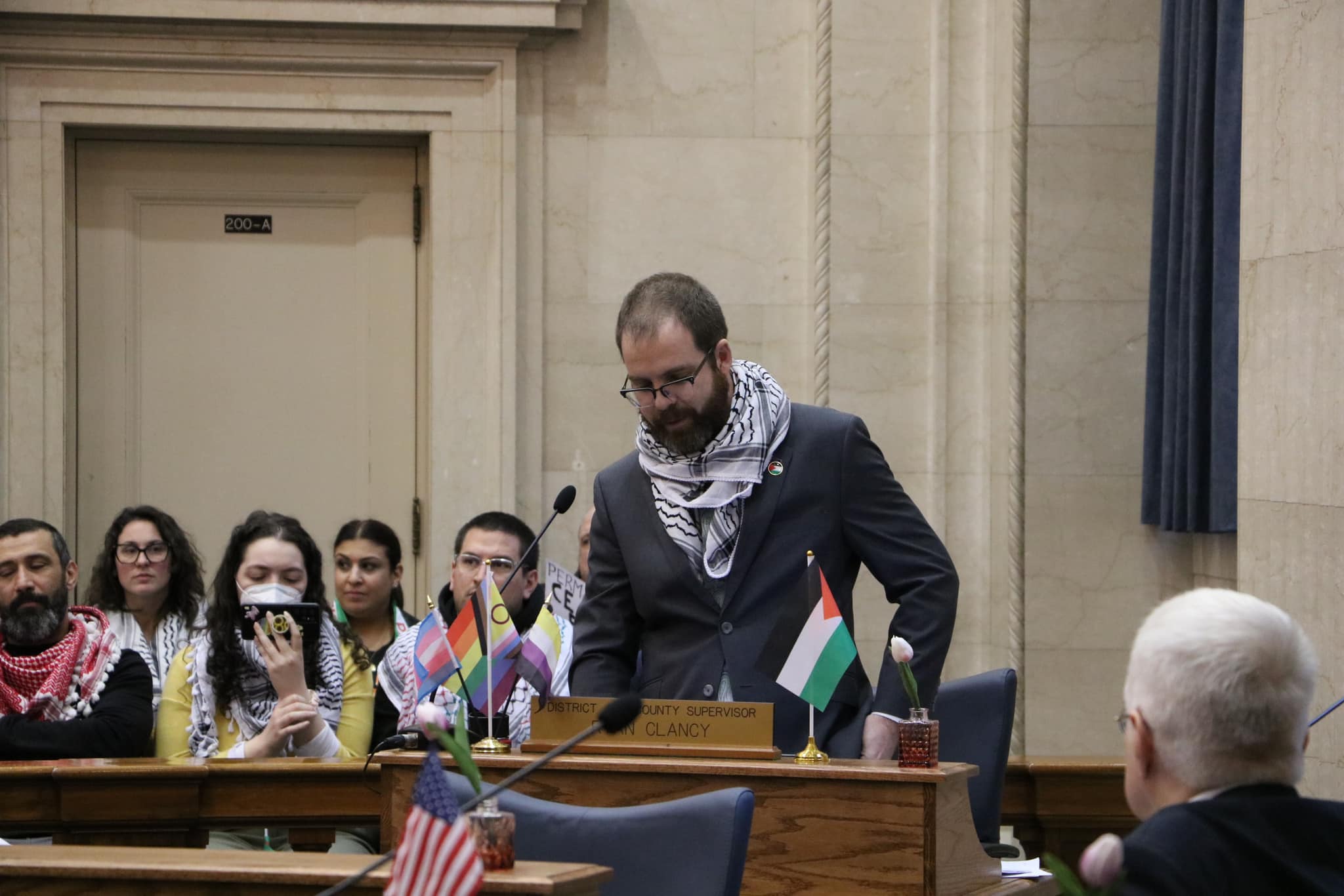
Rep. Ryan Clancy (D-Mil), who is finishing his term as a Milwaukee County Supervisor, proposed the original ceasefire resolution that was modified at the County Board meeting Thursday.
Najeeb estimates 150 resolution supporters were in attendance compared to less than two dozen who opposed it.
Najeeb was among several women Milwaukee County gave a citation for Women’s History Month at Thursday’s meeting. The recognition commended her for “her tireless efforts in promoting peace, justice and understanding and for her invaluable contribution to the cultural, social and civic fabric of Milwaukee and Wisconsin.” Najeeb said she was disappointed she was not given the opportunity to speak, especially since the ceasefire resolution was on the agenda.

“I was really happy that Angela Lang, the founder and executive director of BLOC, Black Leaders Organizing for Communities, (who was also presented a citation and was invited to say a few words on behalf of the awardees) spoke up for the resolution,” Najeeb said.
In her remarks, Lang said, “Now’s the time to do what is right and stand on the right side of history. The bombings and starvation of tens of thousands of innocent children and people should not be something we turn away from.”
Going forward
Milwaukee County’s resolution will give momentum to other efforts to call for a ceasefire, Najeeb said. “People in cities and counties (with resolutions) can say to the Biden administration and our elected federal officials, ‘See what we want? We want a ceasefire!’ I am hopeful they will listen.”
WCJP member Rachel Ida Buff, co-founder of Milwaukee Jewish Voice for Peace, was at the County meeting from 7 a.m. until after the 2:30 p.m. vote. That a resolution passed gives her hope, she said in an interview with WMJ. “We can see where the trend is going nationally and globally, and that elected officials are finally hearing us after six desperately terrible months.
“We also saw we have a really powerful on-the-ground organization in Milwaukee that is pro-Palestine,” she added. “The overwhelming majority of people who turned out and people who called and met with and wrote to their supervisors wanted Rep. Ryan Clancy’s much stronger resolution that talked about genocide and Israel’s apartheid. Yes, Hamas should release hostages but Israel needs to release its hostages, too.
“It is deeply galling for me as a Jew to watch Jewish actors in the state of Israel committing genocide while invoking the Holocaust. It infuriates me. To say, ‘Never again’ has to mean never again for anyone.
“Still, we have to claim the win. We have a ceasefire resolution,” she exclaimed. “And we will continue to organize for the Uninstructed vote and send a clear message to our elected leaders.”



